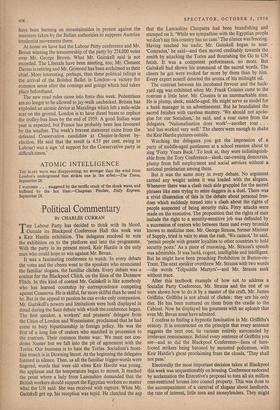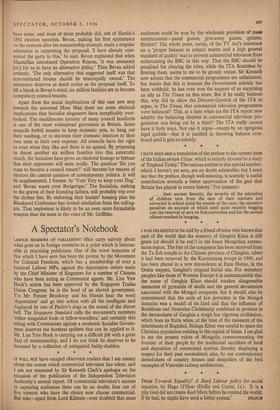Political Commentary
BY CHARLES CURRAN
THE Labour Party has decided to think with its blood. Outside its Blackpool Conference Hall this week was a Keir Hardie exhibition. The delegates resolved to vote the exhibition on to the platform and into the programme. With the party in its present mood, Keir Hardie is the only man who could hope to win against Mr. Bevan.
It was a fascinating conference to watch. In every debate the votes and the cheers went to the speakers who enunciated the familiar slogans, the familiar clichés. Every debate was a contest for the Blackpool Clitch, on the lines of the Dunmow Flitch. In this kind of contest Mr. Gaitskell is like somebody who has learned courtship by correspondence competing against Casanova. He is skilful, far more skilful than he used to be. But in the appeal to passion he can evoke only compassion. Mr. Gaitskell's powers and limitations were both displayed in detail during the Suez debate with which the conference began. The first speaker, a workers' and peasants' delegate from the Cities of London and Westminster, proclaimed that he had come to bury bipartisanship in foreign policy. He was the first of a long line of orators who marched in procession to the rostrum. Their common theme was : We must not con- demn Nasser lest we fall into the pit of agreement with the Tories. Our business is to hate the Tories. Socialism's front- line trench is in Downing Street. At the beginning the delegates listened in silence. Then, as all the familiar trigger-words were fingered, words that were old when Keir Hardie was young, the applause and the temperature began to mount. It reached the point where a lady from Lancashire demanded that the British workers should support the Egyptian workers no matter what the UN said. She was received with rapture. When Mr. Gaitskell got up, his reception was tepid. He clutched the asp that the Lancashire Cleopatra had been brandishing and stamped on it. 'While we sympathise with the Egyptian people we don't say this country has no case.' The silence was freezing. Having reached his nadir, Mr. Gaitskell began to soar. `Comrades,' he said—and then moved creditably towards the zenith by attacking the Tories and flourishing the Go to UN fetish. It Was a competent performance, no more. But Gaitskell had shown his command of the sacred words. The cheers he got were evoked far more by them than by him. Every expert nostril detected the aroma of his midnight oil.
The contrast between his incubated fervour and the back- yard egg was exhibited when Mr. Frank Cousins came to the rostrum a little later. Mr. Cousins is an unremarkable man. He is plump, sleek, middle-aged. He might serve as model for a bank manager in an advertisement. But he brandished the sacred fetishes with careless mastery. 'We should not apolo- gise for our Socialism, he said, and a roar came from the delegates. 'Nationalisation does work'—another roar . . . `and has worked very well.' The cheers were enough to shake the Keir Hardie pictures outside.
Watching the delegates you got the impression of a party of middle-aged gentlemen at a school reunion about to sing 'Forty Years Back.' To look at, they were indistinguish- able from the Tory Conference—sleek, car-owning democrats, plump from full employment and social services without a notional proletarian among them.
But it was the same story in every debate. No argument carried any weight unless it was leaded with the slogans. Whenever there was a clash each side grappled for the sacred phrases like men trying to seize daggers in a duel. There was, a vivid illustration of this in the debate about personal free- dom which suddenly turned into a clash about the rights of people suspected of being security risks. Fiery attacks were made on the executive. The proposition that the rights of man include the right to a security-sensitive job was defended by a succession of orators who between them used every bromide known to medicine men. Mr. George Strauss, former Minister of Supply, tried in vain to stem the rush. 'We cannot,' he said, `permit people with greater loyalties to other countries to hold security posts.' As a piece of reasoning, Mr. Strauss's speech was admirable. It was lucid, cogent, intelligible and intelligent. But he might have been preaching Prohibition in Burton-on- Trent. The.next speaker overthrew Mr. Strauss with two words —the words `Tolpuddle Martyrs'—and Mr. Strauss sank without trace.
After this textbook example of how not to address a Socialist Party Conference, Mr. Strauss and the rest of us were shown how to do it by a master of the craft, Mr. James Griffiths. Griffiths is not afraid of clichés : they are his only diet. He has been nurtured on them from the cradle to the Cabinet. Now he displayed his greatness with an aplomb that even Mr. Bevan must have admired.
I confess to finding a hypnotic fascination in Mr. Griffiths's oratory. It is constructed on the principle that every sentence suggests the next one, its vacuum entirely surrounded by irrelevant reminiscence. Behind every sentence of Griffiths you see—and so did the Blackpool Conference—lines of bare- footed strikers being batoned by mounted policemen, with Keir Hardie's ghost proclaiming from the clouds, 'They shall not pass.'
Electorally the most important decision taken at Blackpool this week was unquestionably on housing. Conference endorsed by acclamation the Executive's proposal to turn all six million rent-restricted houses into council property. This was done to the accompaniment of a carnival of slogans about landlords, the rate of interest, little men and moneylenders. They might have come, and most of them probably did, out of Hardie's 1892 election speeches. Bevan, making his first appearance on the rostrum after his treasurership triumph, made a singular admission in supporting the proposal. 'I have already com- mitted the party to this,' he said. Bevan explained that when Macmillan introduced Operation Rescue. 'it was necessary [sic] for us to have an alternative policy.' Then Bevan added artlessly, 'The only alternative that suggested itself was that rent-restricted houses should be municipally owned.' The admission deserves as much notice as the proposal itself. To till a blank in Bevan's mind, six million families are to become compulsory council tenants.
Apart from the social implications of this vast new step towards the universal Mass Man there are some electoral implications that Socialist sloganeers have inexplicably over- looked. The meddlesome tyranny of many council landlords is one of the most widespread grievances in Britain. Some councils forbid tenants to keep domestic pets, to hang out their washing, or to decorate their domestic interiors to their own taste at their own expense. All councils have the right to evict when they like and there is no appeal. By proposing to thrust another six million families into this autocratic clutch, the Socialists have given an electoral hostage to fortune that their opponents will seize avidly. The question 'Do you want to become a council tenant?' will become for masses of electors the central question of contemporary politics. It will be supplemented, I foresee, by 'Vote Tory to keep your Dog,' and 'Bevan wants your Budgerigar.' The Socialists, rushing to the graves of their founding fathers, will probably trip over the clothes line. By endorsing their leaders' housing plan the Blackpool Conference has invited retaliation from the rolling- pin. That implement is likely to be an even more formidable weapon than the tears in the voice of Mr. Griffiths.



















































 Previous page
Previous page